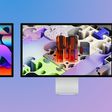
SemiAccurate claims to have heard that Apple will be transitioning from Intel processors to ARM processors in the not too distant future.
The short story is that Apple is moving the laptop line, and presumably desktops too, to ARM based chips as soon as possible.
The site seems to believe that the transition will take place after ARM has moved to full 64-bit cores which won't likely be until at least mid-2013.
At that point, Apple can move to ARM without worrying about obsoleting code with an [instruction set architecture] that is on the verge of changing, and no memory overhead worries either. Basically, it looks like the perfect time. Ironically, SemiAccurates moles tell us that the boys on infinite loop are planning to move laptops to ARM at about that time. Coincidence? Nope.
Apple has made a heavy investment in the ARM architecture which presently powers their iOS line of products. Apple even made the bold move to take ARM processor design in house with the acquisition P.A. Semi and Intrinsity.
Still, a transition of their Mac line over to a different processor architecture is hard to accept. While Apple did previously succeed in such a transition in the past with the PowerPC to Intel transition, it was not without an incredible amount of engineering to ease the process. Existing Mac applications would be unable to run on the new ARM processors without some sort of emulation layer. Mac applications would have to be recompiled to support the ARM processors.
While ARM is known for their low power processors, last year they announced plans to move into high-performance computing in the future, and has been rumored to moving into the 64-bit space as well.
Codenamed "Eagle," the A15 architecture is ostensibly aimed at netbooks and tablets, but a look at the spec sheet leaves no doubt that ARM is absolutely gunning for the server market that Intel and AMD currently dominate.
SemiAccurate has not been a frequent source of Apple-related rumors, but they do point out they were correct in predicting that Apple would move away from NVIDIA GPUs in their computers.





















